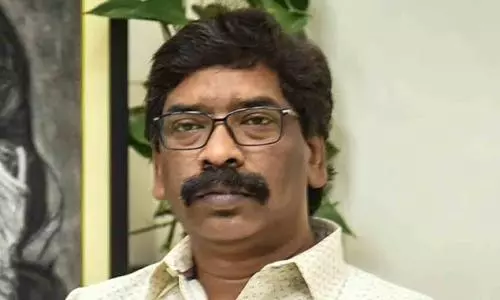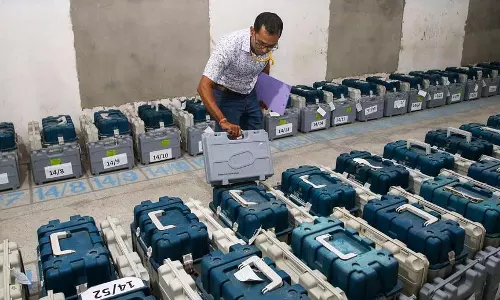
Gagging the farmers?
text_fieldsOctober 2 which marks the birth anniversary of Mahatma Gandhi is observed as the International Day of Non-Violence (Ahimsa).
It also marks the birth anniversary of former Prime Minister Lal Bahadur Shastri who raised the slogan Jai Jawan Jai Kisan (Hail the Soldier, Hail the farmer) for farmer empowerment. It was at a time when the nation revered the memories of these leaders on the birth anniversary of Gandhi and Shastri that Narendra Modi government quashed a protest rally led by farmers to Delhi seeking an end to crucial issues of their lives, with the help of soldiers and the police. It is also in a situation where the BJP at the Centre brags about the current progress and future growth of the country, that the poor farmers in north India who sought their fair rights were suppressed using tear gas, water cannons and baton charges. The authorities had blocked the rally and unleashed brutal attacks on the thousands of farmers organising the Kisan Kranti Yatra led by the Bhartiya Kisan Union (BKU), that had started from Haridwar on September 23, in the name of violating the ban preventing them from entering Delhi. The goal of the march was to reach the memorials of Chaudhary Charan Singh, a farmer leader, at Kisan Ghat and stage a sit-in protest by raising their demands.
BKU Kranti Yatra led by Naresh Tikait, the son of Mahendra Singh Tikait, kickstarted with 15 demands such as waiving off farmer loans, reducing fuel prices, providing adequate support prices for crops, lifting the ban on tractors that are more than 10 years old in the national capital area, lowering electricity rates, determining the support price for winter crops, stopping the import of agricultural products that are produced on a large scale in the country, implementing the M S Swaminathan report which recommended solutions to the problems related to agriculture and farmers, and waiving off loan debts that occurred due to severe drought, deluge and reduction in support prices. The central government under no provocation, was blocking the farmers who had been holding a peaceful march towards Delhi with hundreds of tractors and trolleys for 10 days.
It was clear that the police action by the Centre was motivated by the urge to obviate the possible embarrassment in case the agitation reaches Delhi at a time when elections to the assemblies of different north Indian states are drawing close. When Central Home Minister Rajnath Singh got information that the strike was at the Delhi border, he called the leaders for discussions. But Tikait and followers, who held that the negotiations just created the impression that seven of the demands were met, declared the talks as a failure and were moving forward with the march. That was what prompted the government to stop the march at any cost and this led to the confrontation. Many farmers and policemen were injured in the clashes. Tractors and other vehicles were destroyed. But when protests rose from different parts of the country against this rampage conducted on Gandhi Jayanti day, the Centre was forced to concede to the strikers on late Tuesday. The agitators were allowed into Delhi with heavy security, and after everyone reached Kisan Ghat, they dispersed. Central agriculture minister also informed them that all the major demands would be met, including 5% reduction in the GST of agricultural materials, demands related to the price determination of sugar cane and amendments in insurance bill.
If the government could respond so sympathetically to the farmers' demands, then what was the point in blocking the thousands of unarmed men first at the capital's border, beating and chasing them away? Apart from the fact that agriculture and farmer issues figure in prime minister's mann ki baat and his campaign speeches, there is substance in the complaint that he does not take those issues seriously enough, as borne out by the violence carried out against the farmers. In addition to that, farmers are left with the grouse that even while returning after ending the strike through negotiations, the government stopped short of saying anything about electricity tariff and price of sugar cane, and only gave an assurance that the demands would be tabled for discussions.
As part of the Eleventh Five Year Plan, the Central Government formed in 2004 the National Commission on Farmers for the welfare of agriculturists under the leadership of Dr MS Swaminathan. In the reports submitted by the Commission during the period from December 2004 to October 2006, the last one was a comprehensive package for improving the conditions of the farms and farmers and to solve the problems. None of them has been taken up for implementation by governments. It was in such a situation that theBJP government at the Centre added insult to injury with added woes through demonetization, GST and fuel price hikes. Now this is the second time that a farmer agitation is flooding against the Centre which blows its trumpet about its reforms. What we saw in Delhi was an attempt of Modi government - which tries to find solutions to issues by closing its eyes – to gag the voice of protests. Finally there emerged a picture of the government having to yield to the demands of farmers. But, since the farmers have made it clear that the government will not be allowed to get away by mere gimmick, Modi government will be forced to do something for overcoming that challenge.























